- A
- A
- A
- ABC
- ABC
- ABC
- А
- А
- А
- А
- А
‘You Can Do Research at HSE University from Your Very First Year’
HSE University Life is continuing its coverage of the Student Life Survey 2020. Part of the survey asked students about their participation in the university’s research activities and their relationships with their academic supervisors.
Student involvement in research and academic life is an important goal of HSE University. The university’s research departments welcome research assistants and encourage participation in projects and events such as conferences, seminars, and roundtables.
‘Research assistant’ is the most junior research position at the university, and research assistants are usually students and doctoral students interested in specific projects. Research assistant positions are available at the university’s research and international laboratories, centres and other research departments. This gives students the chance to gain experience doing research work as part of a group before graduation, and the opportunity to continue immediately afterwards.
Twenty-two percent of HSE University students are involved in research activities in one form or another. Naturally, interest in research grows over the course of students’ studies, but some students start working as research assistants by the end of their first year of study.
Students are also involved in research work independently of the university’s departments, be it in the form of individual projects by academic supervisors and teachers, the university’s Project Fair, and student organizations. They can also get involved in research outside the university through partner research organizations, external grants, and more.
Such students make up 18% of the student body, and some of them work on multiple projects outside HSE University’s institutes, centres and laboratories at once.
Figure 1. Participation in any form of research.

Margarita Suleymanova
HSE University offers a range of tools for integrating students into the world of research. The most prominent is the Student Research Paper Competition, which has been held every autumn since 2003. More than two-thirds of students are familiar with the competition.
HSE students are well aware of the existence of travel grants for attending research events and the HSE University Project Group Competition, which was first held in 2020. However, far fewer students know about other opportunities, such as in-depth information for HSE researchers (see here for more information) and the Science Republic project.
Figure 2. Familiarity with tools for student integration into research at HSE University. Comparison by tool.

Margarita Suleymanova

Yulia Falkovich
Director of the Centre for Scholarly Integration
HSE is a research university, and students can start doing research in their first year. Here, ‘student research’ is no different from regular research. Students engage in serious work, with all the corresponding standards and principles such as ethics. There are no limitations or barriers between fields of study or academic programmes. Students are welcome to work with departments in other faculties and fields.
The results of the survey show that students are aware of traditional forms of research: projects and the Student Research Paper Competition. But there are still many who don’t know about the opportunities to do research at a more interesting, serious level. For example, students can work as research assistants in laboratories and join research and study groups. The lack of awareness of these possibilities stems from the fact that students often don’t think about participating in research or gaining valuable knowledge for their future careers—including those in business and consulting. Plus, in addition to research, students also take part in other extra-curricular activities, such as creative and social projects.
Student involvement in research activities varies by faculty. The highest levels of involvement are seen in master’s students of the Institute of Education, the faculties of the natural sciences (chemistry, physics, mathematics), and students of the Faculty of Humanities and the Faculty of Social Sciences. Involvement in projects outside HSE laboratories and other research departments is high among students of the Faculty of Economic Sciences, the Institute of Electronics and Mathematics, and the Faculty of Law.
Figure 3. Participation in research. Comparison by faculty.

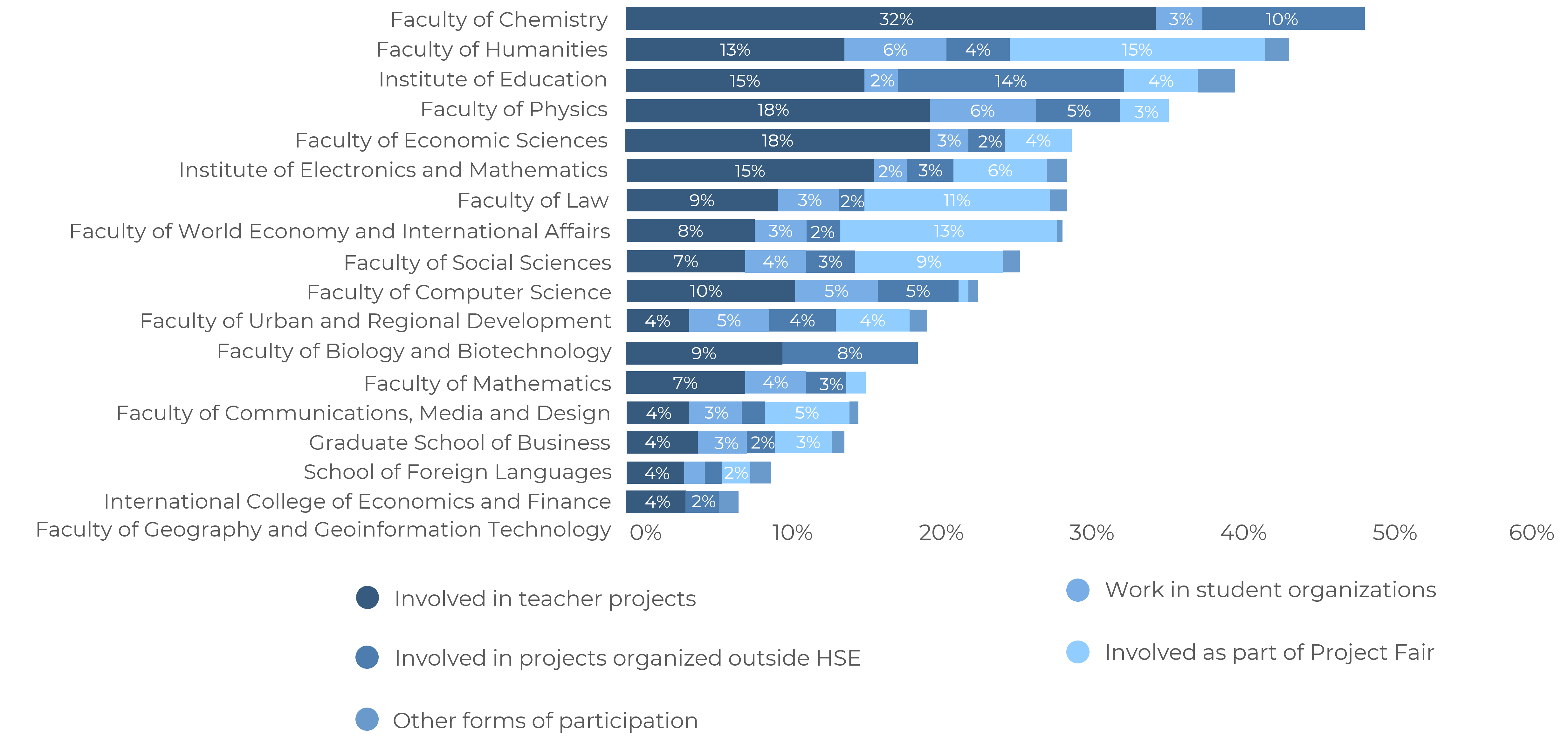
Margarita Suleymanova
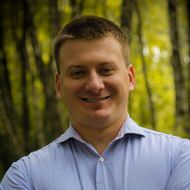
Denis Stukal
Deputy Dean of the Faculty of Social Sciences, Deputy Director of the Institute for Applied Political Studies
This survey shows that a large proportion of students of the Faculty of Social Sciences participate in the activities of various research departments. We pay a lot of attention to this figure: this year, there was a separate assessment criterion for student involvement based on submissions to the Project Group Competition for staff members. This is an important metric in selecting applications to create laboratories, research and academic alike. As such, the high value of this criterion in the survey is no surprise, though it’s nice to see. However, there is still a lot of room for further development.
Around a quarter of students are actively involved in research activities—although all HSE University students are connected to research in one way or another, such as by writing term papers and theses. For many students, their experiences with academic supervisors are a gateway into the world of academia.
There are different ways for students to find academic supervisors:
— They can first decide on an area of interest and search for a suitable supervisor. This is the preferred practice in the Institute of Education and ICEF.
— They can, on the other hand, start with a preferred supervisor and then choose a research topic. This happens regularly in the Faculty of Humanities, the Faculty of World Economy and International Affairs, and the majority of natural science faculties.
— They can look for both at the same time. This is common practice for students of the Graduate School of Business, the Faculty of Computer Science, the Faculty of Economic Sciences, the Faculty of Social Sciences (where the academic supervisor themselves is a more significant deciding factor), and the Faculty of Law (where the topic is more influential than the supervisor).
Some students have little to no choice at all. This often the case for students of the Faculty of Biology and Biotechnology and the Faculty of Communications, Media and Design.
Figure 4. Order of priority between choice of academic supervisor and topic of term paper. Comparison by faculty.

Margarita Suleymanova
Usually, finding an academic supervisor is only the beginning—students must meet with them periodically (via Zoom at the very least). However, each faculty has its own definition of ‘periodically’. Students of natural science faculties meet with their academic supervisors once a week or more, while most students of the Graduate School of Business, ICEF, the Faculty of World Economy and International Affairs, and the Faculty of Law see their academic supervisors once a month or less.
Figure 5. Frequency of meetings with academic supervisors. Comparison by faculty.

Margarita Suleymanova

Fedor Kluev
Head of the Research Committee of the Student Council, Faculty of Chemistry
Students of the Faculty of Chemistry are actively involved with research laboratories.
We get involved in research almost right away. From the very first year, the curriculum includes a dedicated day for research work. Then, based on the results, we publish articles and write reports that go towards the assessment of our degree work. Some laboratories also serve as a basis for the creation of research and study groups, which is a plus.
The end goal of working with an academic supervisor—the preparation of term papers and thesis work—is achieved at different paces. For most students, their work is more than half ready a month before the final deadline. For the same period, the work is either almost or completely ready for the majority of students of the School of Foreign Languages, while those of ICEF and the Faculty of World Economy and International Affairs reported that their work was less than half ready.
Figure 6. Readiness of term papers one month before the final deadline. Comparison by faculty.

Margarita Suleymanova
Interactions vary between students and academic supervisors while working on term papers. In most cases, academic supervisors comment on students’ results and methods, help with literature and the selection of methods, and edit the resulting texts. Academic supervisors become more involved with students’ work each year, while the volume of edited texts decreases.
Patterns of interaction also differ by faculty. Students of natural science faculties, the Faculty of Humanities and the Faculty of Social Sciences have the most interaction with their academic supervisors, while students of ICEF, the Faculty of Communications, Media and Design, and the Faculty of Law have the least amount of interaction—though such interactions are active.
Figure 7. What do academic supervisors do with students regarding term papers/thesis work and their defence. Comparison by type of interaction.

Margarita Suleymanova
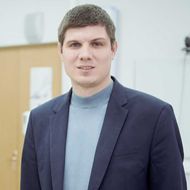
Evgeniy Terentev
Director of the Centre of Sociology of Higher Education
Academic supervisors and the possibilities of working with them are one of the most important factors in integrating students into the university’s academic life. In the best cases, academic advisors not only help students with their thesis and degree work, but they also serve as guides into the world of academia. They do this by including students in their professional networks, helping them get accustomed to research at the university, and introducing them to the academic community both in Russia and abroad. Students generally spend more time in joint discussions with their academic supervisors than with other teachers and staff. This highlights the importance of a responsible approach to matching students with supervisors and establishing constructive relations based on clear expectations on both sides.
The most significant factor in the success of joint work between students and academic supervisors is satisfaction with their relationship, and 63% of students rated their interactions with their supervisors as ‘good’ or ‘great’. Students of the Faculty of Communications, Media and Design gave worse ratings overall, while students of the School of Foreign Languages, the Faculty of Humanities and the Faculty of Mathematics gave higher ratings.
Overall, the highest ratings came from students of Master’s programmes and those studying in state-funded places.
Figure 8. Ratings of the effectiveness of interactions with academic advisors. Comparison by level and form of study and by faculty.

Margarita Suleymanova
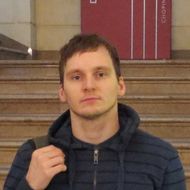
Sergey Shershakov
Associate Professor of the Faculty of Computer Science, Academic Supervisor of the System and Software Engineering programme
Project work at the Faculty of Computer Science (which includes term papers and thesis work) is often practical in nature. This is largely due to the kind of academic programmes and topics offered by the faculty. Students of the Faculty of Computer Science are known for their motivation to obtain an education in their chosen field. They also have a clear idea of what they want to study, be it new technologies for developing software and information systems, programming languages and frameworks, new algorithms for specific fields (such as machine vision and process analysis), new approaches to machine learning, and more. Usually, dedicated experts and groups work on a specific area within the faculty, so students usually choose both their area of interest and their academic supervisor at the same time.
Students who choose to pursue research work usually make pretty informed choices. Research involves working closely with an academic supervisor—it isn’t enough to just complete a set amount of work by a deadline, you have to verify your results regularly and consider them with a critical eye. You need an expert in the chosen field in order to do this quickly and effectively. Personal experience shows that research done by students in an independent, conscious and motivated way ends up being either excellent or sub-par.
Looking back over their term papers or thesis work, 58% of students reported that they would not change their topic or academic supervisor. Of those who would change something, male students were more likely to want a different topic, while female students were more likely to want a different advisor.
Figure 9. Desire to change topic and/or academic advisor. Comparison by sex and year.

Margarita Suleymanova
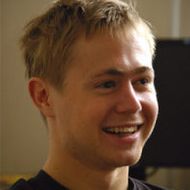
Ivan Gruzdev
Director for Internal Monitoring and Student Academic Development
There is a lot of variety in the HSE student body. We have almost 50,000 students studying in a wide range of disciplines. That’s why we work to offer as many kinds of support as possible for student research and popular science initiatives in order to meet existing demands.
For example, students participating the in the Science Republic project can form research groups and get support for their own research projects. The Centre for Student Academic Development runs a student research project competition to support a wide range of research ideas proposed by student groups.
In addition, students who want to do more than just research can take advantage of tools to popularize their work. Next year will see the addition of a new stage of the Research Battle project, which been held since 2017. The organizers are looking for research assistants willing to share the results of their research not just within academia, but in wider society.
We hope that these mechanisms and others will help as many students as possible to get involved in research.

